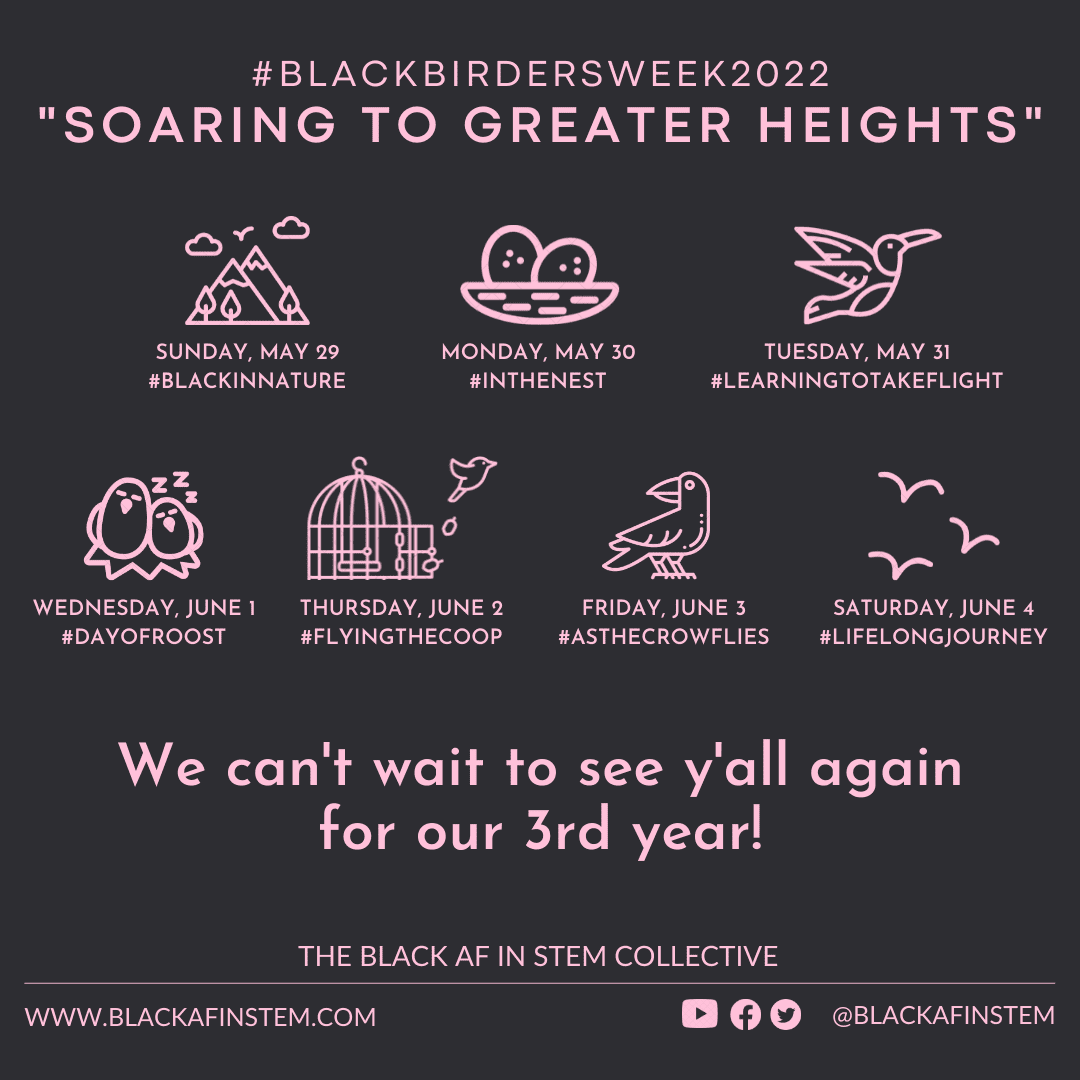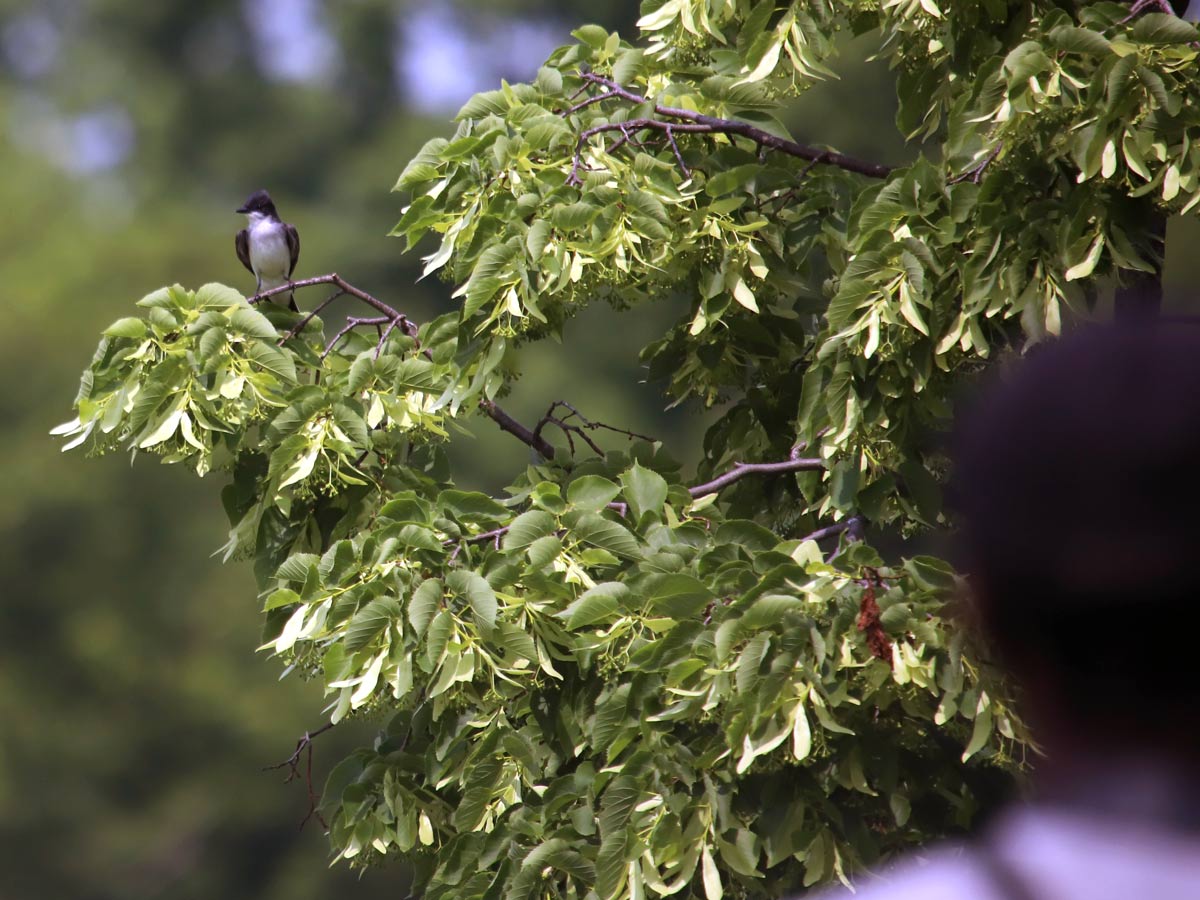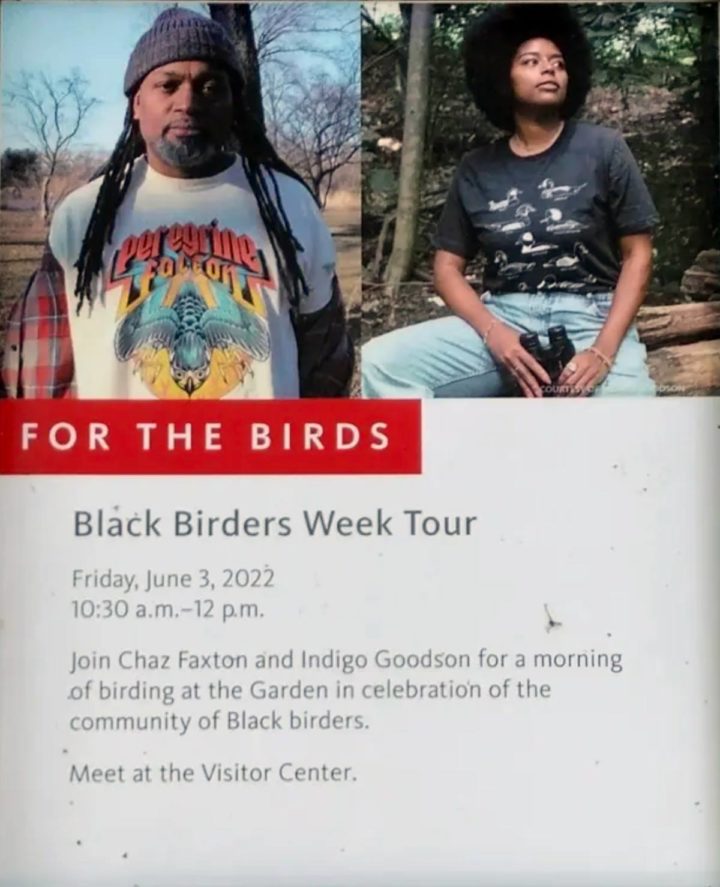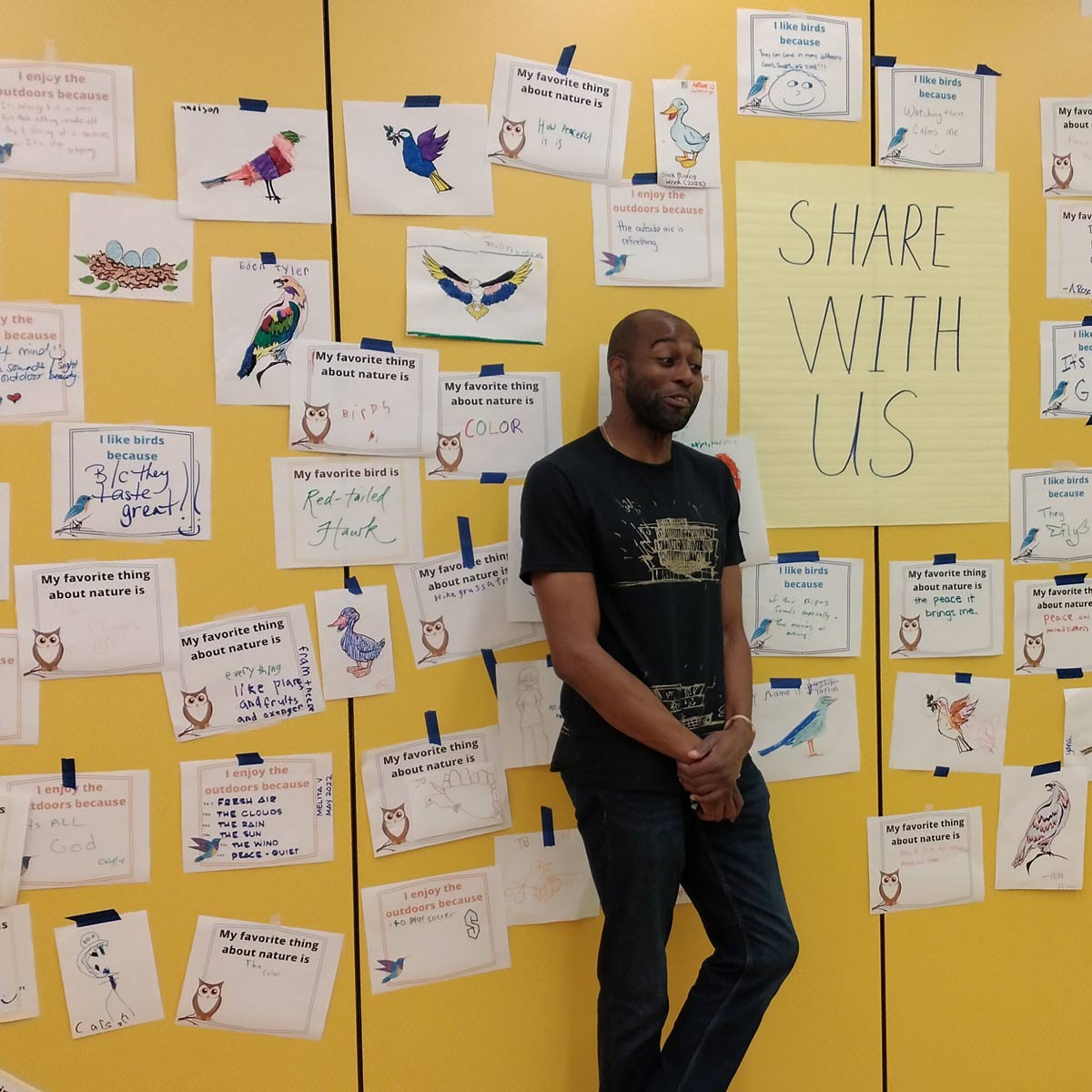Third Annual Black Birders Week Soars To Greater Heights
This year's weeklong celebration featured online discussions of topics like culture and mentorship—and added a variety of in-person events offering a chance for people to enjoy birding together.
June 22, 2022Adé Ben Salahuddin is a co-organizer of Black Birders Week 2022. He provided us with this reflection on the events of the week.
Barely seven days before the start of Black Birders Week 2022, I was standing with science educator Dara Wilson inside the Smithsonian’s National Museum of African American History and Culture. We’d just finished recording a set of basic birding instructional materials for a Black Birders Week-themed page on the museum’s website. Over our heads, a set of screens cycled between black-and-white photographs of African American grassroots organizations and their members, both familiar and unsung. These were ordinary people who formed communities to protect and uplift each other in the face of discrimination, now memorialized.

It was for similar reasons of community and encouragement that Black Birders Week was first organized, in 2020. The now annual, primarily online event was created by the Black AF in STEM Collective, a group of young Black biologists and nature enthusiasts. The goal was to bring greater representation to the world of birding in response to incidents like the one in Central Park in 2020 involving Black birder Christian Cooper. That altercation highlighted the pervasive obstacles, dangers, even hostility that Black people often face when we’re outdoors. As I mentioned in last year’s coverage, Black Birders Week has evolved from a collective reaction to a painful situation to a celebration of the people in our communities who have found joy, inspiration, and peace in birds and nature.
This year’s overarching theme, “Soaring to Greater Heights,” was a nod to the continued growth and expansion of Black Birders Week. Each day from May 29 to June 4, the week’s activities and online discussions explored a different theme emphasizing steps along the birding journey. Participants and organizers alike reflected on their own experiences, painting a mosaic of birding through different cultures and perspectives across the African diaspora. For instance, the first day saw more than 100 people from the U.S., Canada, the Caribbean, Europe, and Africa introducing themselves and showing off their birding experiences using the hashtag #BlackInNature.
Herpetologist and Week co-organizer Chelsea Connor kicked off a collaboration with the podcast BirdNote Daily with an episode about the Black Heron, highlighting the bird’s clever fishing strategy and its symbolism among local cultures across sub-Saharan Africa. The next two days, titled #InTheNest and #LearningToTakeFlight, featured a pair of webinars exploring the crucial role of mentorship and community in creating new birders, from the points of view of both mentors and beginners (moderated by Deja Perkins and hosted by the Cornell Lab; archived here). Later that week on Thursday’s #FlyingTheCoop, viewers were treated to the tropical sights and sounds of a virtual bird walk in the Bahamas before tuning in for a presentation by Canadian teacher-turned-wildlife photographer Jason George and his journey with dyslexia.

A New Dimension: In-Person Events
Where this year’s events really moved beyond the formula of previous years was in offering in-person events. With outdoor gatherings remaining a safe and popular way for people to physically interact, it’s only natural that folks are looking to hit the trails themselves and find communion in the nature around them. Environmental educator Nicole Jackson and urban ecologist Deja Perkins, both longtime Week co-organizers, hosted four bird walks (and a raptor demonstration) in their Ohio and North Carolina communities throughout the week, in addition to contributing to the virtual panels. Additional events included a nature walk hosted by Outdoor Afro of Southern California, and a bird walk in Pennsylvania led by environmental educator Brianna Amingwa.

Over in New York City, I got to help develop and attend five bird walks through local parks and greenspaces. I began my Friday with a mid-morning venture through the Brooklyn Botanic Garden, co-led by Chaz Faxton and Indigo Goodson. We saw plenty of the typical city birds like House Sparrows, Blue Jays, and Northern Mockingbirds–even a Baltimore Oriole–but the biggest thrill came after the official walk had ended and about half of the 25 attendees lingered to look out over a field. Suddenly, a Cooper’s Hawk dived in from directly overhead and snatched a fledgling European Starling we’d been looking at, barely a dozen yards in front of us. (Pro-tip: whenever you think you want to leave is always when the surprises happen.)
Although birds were the focal point, I found it even more memorable getting to meet other birders and enjoying moments together in the same physical space. After taking a solitary afternoon stroll through nearby Prospect Park, I headed to Marsha P. Johnson State Park to meet up with Roslyn Rivas, a Bronx-based wildlife biologist and friend from college who was leading a bird walk there that evening. This particular event, titled Birds and Brews, had been curated in partnership with the Brooklyn Brewery and was squarely aimed at a young adult demographic. Jenna Marie Otero, an environmental education assistant at the New York State Office of Parks, Recreation & Historic Preservation, spearheaded the bird walk + bar night collaboration. Nearly 20 people came, a racially and ethnically diverse group of almost entirely first-time birders, with a handful of veterans among them. The walk itself was only about 35 minutes–Marsha P. Johnson State Park is a relatively small space–but the participants enjoyed highlights like a flock of Double-crested Cormorants sunning themselves in the East River.

Back at the Smithsonian, Dara and I were in the Explore More! Gallery helping museum attendees examine owl pellets and stray feathers under microscopes. A little Black girl, likely no older than 4, held a magnifying glass to her face as her mother helped her gently tease apart the tiny, slender bones of an owl’s meal from the dry gray fluff encasing them.
I watched her examine and compare the different elements, using an illustrated sheet on the table in front of her to help tell a bird skull from a mouse leg. I beamed under my mask, elated that I could help bring this experience to this young anatomist in the making.
Across the room, an older Black man from New Orleans excitedly showed Dara videos of the Ospreys near his house, the beautiful predators boasting massive orange-scaled catches. “It’s good to know I’m not the only Black person who likes birds!” he called to us as he left.
Standing in that space and looking out over the room, I took in the moment. Only a few months prior, I’d just started taking my new binoculars out to look for birds at a small pond near my house. Now, in one week, I’d been on seven different bird walks across multiple states, added over a dozen new species to my eBird list, and most importantly made new connections with dozens of people. And as a homecoming surprise after all the work and travel was over, I found out that the community-building aspect of Black Birders Week had finally started taking root in my own Connecticut hometown while I’d been away.
“It’s good to know I’m not the only Black person who likes birds!” the man at the Smithsonian had called out to us.
Indeed it is, brother. Indeed it is.
Adé Ben-Salahuddin is a co-organizer of Black Birders Week 2022. He is an aspiring undergraduate-level evolutionary biologist and freelance science educator whose favorite birds are still all extinct (terror birds and moas). You can follow him on Twitter and YouTube for videos about prehistoric life, the people who study it, and how we talk about it.

All About Birds
is a free resource
Available for everyone,
funded by donors like you
American Kestrel by Blair Dudeck / Macaulay Library